Best DDR3 RAM: 10 memory kits reviewed and rated
The best DDR3 memory kits revealed
Patriot Viper Xtreme Div 4 Series
Model number: PXQ316G1600LLQK
Price: £85
Configuration: Quad-channel 16GB kit
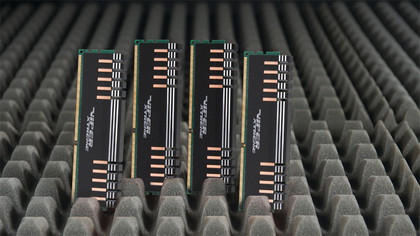
Plumping for Intel's premium LGA 2011 platform and X79 chipset means it doesn't make sense to skimp on relatively minor expenses like system memory. That's why all our quad-channel kits are 16GB. An extra £40 or so is a small price to pay for an additional 8GB, in the context of the hundreds you'll be spending on a motherboard, CPU and the rest.
That's true even if 16GB only rarely delivers more real-world performance than 8GB. The question, then, is whether you stick with a moderately priced and clocked kit like the Patriot Viper Xtreme Division 4 Series 16GB, or aim for something a bit fancier.
Out of the box, it certainly doesn't look like Patriot has been cutting any corners. You get the full heat-spreader treatment with medium height fins that strike a tolerable balance between cooling efficacy and practicality. We certainly wouldn't want anything taller.
Tthen again, the quoted frequencies and timings aren't exactly exotic. A speed of 1,600MHz with 8, 9, 8, 24 latencies isn't busting any records, though at least support for XMP means you'll achieve that without any hand tuning.
We were also pleased to see timings of 7, 8, 7, 20 pop up when running at 1,333MHz. In fact, it's a toss up whether to run this kit at higher frequencies or lower latencies.
Low league
Our tests suggest that for games, this kit is a bit quicker running at 1,333MHz. Overall, the Viper Xtreme Division 4 has plenty going for it, but it loses out to a Kingston kit that delivers the best gaming performance and the highest frequencies - albeit at a price.
Sign up for breaking news, reviews, opinion, top tech deals, and more.
Verdict: 4/5
Transcend aXeRam 2000+4GB
Model number: TX2000KLU-4GK
Price: £48
Configuration: Dual-channel 4GB kit
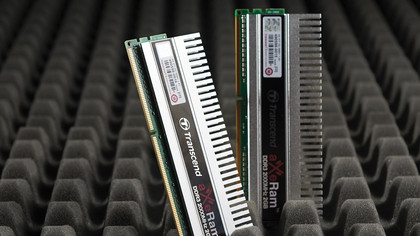
Every litter has a runt - an illegitimate backstairs sprog that nobody wants. Unfortunately for Transcend, it has the competition squarely beaten when it comes to being a bit ginger.
Tthe bad news for the axeRam 2000+ starts with its £48 price tag. Not a dramatic amount of money, you say? Indeed it isn't, but this RAM kit packs a mere 4GB in two sticks of 2GB dual-channel format. That's more than twice the price of a basic 4GB kit, which means it's going to have to do something very special.
And so it does, but we're talking 'special' as in 'especially bad'.
Hertz me so
This isn't the only kit we've tested that has failed to achieve its advertised clockspeed (in this case 2,000MHz), but it's the only one not to drag its sorry behind above the default 1,333MHz setting. In truth, that probably wouldn't be a huge problem if it delivered, let's say, some really nice latencies at 1,333MHz. Instead, it serves up ye olde 9, 9, 9, 24 numbers, which at best put the bog into standard.
Admittedly, this memory kit does manage some tolerable performance results. Actually, it knocks out the fastest frame rate of the dual-channel kits in our x264 video encoding benchmark. But then we're talking about a fraction of a single frame per second.
Where it really matters - in a game - it was well off the pace. With all of that in mind, it's hard to give too much credit for what appears to be excellent build quality by transcend. In fact, if anything, the cooling fins are only likely to get in the way. Overheating is hardly going to be an issue at 1,333MHz, is it?
Verdict: 4/5
Transcend JetRAM 8GB
Model number: JM1600KLN-8GK
Price: £70
Configuration: Dual-channel 8GB kit
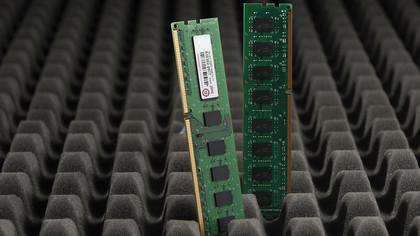
Transcend's 4GB 2,000MHz kit suffered a horrible shoeing, but we're pleased to report that this budget-orientated 8GB effort is a much tougher customer. In fact, it beats just about every other dual-channel kit here apart from Corsair's shiny white Vengence kit, and even then the fight went the distance and ended in a points decision.
So, how does the JetRAM 8GB conspire to punch above its weight? As the only kit here without any kind of heat spreaders, it certainly looks like a nine-stone weakling. But here's the thing: it's one of the few RAM kits on test that managed to outrun its officially quoted frequency.
Transcend promises to deliver 1,600MHz, but you actually get 1,866MHz instead. Admittedly, you're looking at some pretty shonky 11, 11, 11, 28 latencies to run at that speed, and there's no XMP support, so if any improvement is possible, you'll be hand tuning these puppies.
But then cranking up the frequencies doesn't make a great of difference at the best of times. And the 9, 9, 9, 24 latencies at 1,333MHz are perfectly tolerable given the piffling £35 price tag.
DIMM-Tastic
Include the fact that these bare DIMMs will take up less space in your system than anything with heat spreaders, and you might be wondering why the JetRAM kit doesn't take top honours.
The main issue, however, is gaming performance. It's not terrible, but it's behind the results of the Corsair's Venegence kit. We think that's worth an extra £12. And anyway, we're suckers for anything with a dash of stormtrooper white.
Verdict: 4/5
Corsair Vengence Low Profile White 8GB
Model number: CML8GX3M2A1600C9W
Price: £47
Configuration: Dual-channel 8GB kit
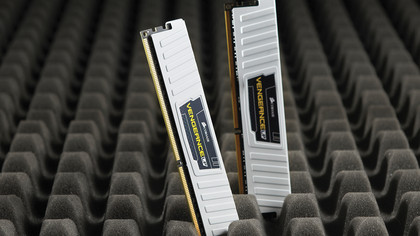
You can't beat a bit of stormtrooper white and, let's be honest, separating the good RAM from the bad is a chore. Appreciating the Corsair Venegence Low Profile's spurious Star Wars-esque aesthetic is as good a reason as any to give it top billing among the dual-channel brigade, right?
Actually, there is some method to our madness. It was an awfully close run thing between the Vengence and Transcend's virtually threadbare JetRAM 8GB kit. After all, the transcend kit is £12 cheaper, offers the same capacity, the same latencies running at the default 1,333MHz frequency and hits a higher peak frequency.
If you examine most of the performance results there's either nothing in it or the transcend kit actually has the edge. At 1,333MHz, it's infinitesimally but verifiably quicker in our x264 HD video encoding test - 31.67fps plays 31.65fps. Yeah, we know, it's dramatic stuff.
Squeaks a win
Up the ante with increased clocks and the gap grows to fully 0.4 frames per second. Yes, really. That's what the Transcend's 1,866MHz buys you compared with the Corsair's 1,600MHz.
Of course, 1,866MHz is all very well, but when it comes with terribly tardy 11, 11, 11, 28 timings, well, you might expect something to give. That's where things start looking up for the Corsair Venegence.
At 1,600MHz, it delivers the same 9, 9, 9, 24 latencies as it does at 1,333MHz. At least in part, that explains why it delivers the best minimum frame rates of all the dual-channel kits in the most important test, the World in Conflict benchmark.
The margins are small, we'll happily admit. We're talking one or two frames per second at most. But it's true both at the default 1,333MHz frequency and the top speeds achieved by any of the kits. We care more about gaming than anything else, so these results matter.
Iit also doesn't hurt that the Vengence Low profile white 8GB kit achieves all this courtesy of the lowest voltages of any of the kits we tested. Okay, 1.35V memory versus 1.5V or 1.65V memory isn't going to save the planet - or your bank balance - but all others things being equal, lower voltage is better than higher voltage.
When it comes to cooling Corsair gets it right, too. Exactly how much difference cooling technology makes to modern RAM is debatable. The bare transcend JetRAM kit, for instance, didn't get hot to the touch even running at 1,866MHz. But it's just possible long-term stability and reliability might be betting with some kind of heatsink.
However, given the marginal benefits, we're no longer keen on seeing large cooling fins growing from the top of the DIMM. We very much doubt they have any impact on performance or reliability. But they definitely get in the way of CPU coolers.
If you're going to have cooling, we want it just like this. Low profile heat spreaders, and they're white. You gotta dig anything that looks like a stormtrooper, right?
Verdict: 4/5
Kingston HyperX 16GB
Model number: KHX2133C11D3K4/16GX
Price: £115
Configuration: Quad-channel 16GB kit
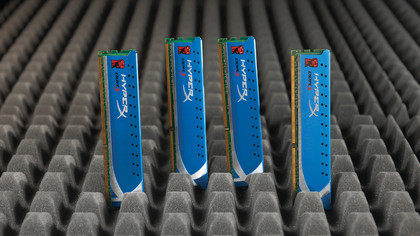
That you can get bags of RAM for very little of your hard-earned money goes a long way towards off-setting the fact that there's not much to get excited about these days. If £40 will buy you a decent dual-channel kit. Why pay more?
If, however, you're running intel's new LGA 2011 platform and the x79 and Sandy Bridge E processors that go with it, one good reason to spend more is to populate all four memory channels.
As it happens, we've tested the x79 platform in dual and triple-channel mode and, if we're honest, spotting any performance drop off is tricky.
Fly my beauty
But hey, you never know, and it just feels wrong running a super-CPU costing over £500 with half its legs chopped off. The same thing applies to choosing 16GB over 8GB. Rarely, if ever, will you run up against the limitations of 8GB of RAM in a desktop PC. But again, you never know, and it seems churlish to unload all that cash on an x79 system and take the risk, however small, of spoiling it by not having enough memory.
Sso that's 16GB over four channels justified, but what about this RAM kit's £115 price tag? That's more than any of the other quad-channel kits on test.
In mitigation, this is the only four-way kit that's rated at 2,133MHz, and it's the only one that achieved that speed in testing. It also put out some very, very nice latencies when running at the default 1,333MHz frequency. 7, 8, 7, 19 makes it the lowest latency kit of the lot, including the dual-channel efforts.
That no doubt contributes to it being the quickest in the Cinebench 11.5 professional graphics rendering test - only by a fraction of a point, but a win's a win.
Much more significant, by our reckoning, is gaming. That's where this kit really delivers, beating all comers by two frames per second in World in Conflict with a minimum frame rate of 52. The only snag is that it does its best gaming work running at 1,333MHz, not 2,133MHz.
If that seems like an odd result, the latencies fall off pretty horribly to 11, 12, 11, 30, which goes a long way to explaining why this Kingston HyperX kit is actually slower across the board in all our application benchmarks, when running at 2,133MHz than 1,333MHz.
Of course, it does deliver a spectacular 44GB/s of bandwidth, but on the desktop that just doesn't matter. There aren't any applications that can particularly make the most of that kind of monster throughput.
No gimmicks
Finally, kudos to kingston for not giving in to gimmicks and bolting on some silly, oversized heat spreaders. Like our dual-channel winner, the HyperX 8GB has opted for low profile heat spreaders that won't bork your CPU socket.
Hang on, did we just say Kingston had resisted gimmicks? That's possibly a little premature when you peruse the specification list and discover gold-plated contact fingers. Ah, well, it's too late to rearrange the scores now. Victory is for Kingston, gold medallion accessories and all.
Verdict: 4.5/5
Technology and cars. Increasingly the twain shall meet. Which is handy, because Jeremy (Twitter) is addicted to both. Long-time tech journalist, former editor of iCar magazine and incumbent car guru for T3 magazine, Jeremy reckons in-car technology is about to go thermonuclear. No, not exploding cars. That would be silly. And dangerous. But rather an explosive period of unprecedented innovation. Enjoy the ride.